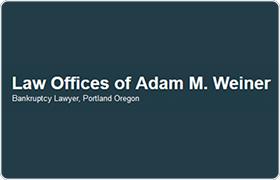Eagle Creek Bankruptcy & Debt Lawyer, Oregon, page 5
Sponsored Law Firm
-
 x
x

Click For More Info:
-
Law Offices of Adam M. Weiner
8624 SE 13th Ave Portland, OR 97202» view mapBankruptcy & Debt Premier Bankruptcy Attorney
Life doesn’t always have to be hard. Consult with a bankruptcy attorney who looks out for your best interests. Call today to begin the process for a fresh financial start.
503-719-5123
Sara A. H. Sayles
Land Use & Zoning, Commercial Real Estate, Permits, Bankruptcy
Status: In Good Standing Licensed: 16 Years
Kenneth Stephen Mitchell-Phillips
Banking & Finance, Administrative Law, Business, Bankruptcy
Status: In Good Standing Licensed: 18 Years
Brian D. Chenoweth
Eminent Domain, Franchising, Collection, Products Liability
Status: In Good Standing Licensed: 30 Years
Michael John Farrell
Litigation, Insurance, Credit & Debt, Personal Injury
Status: In Good Standing Licensed: 35 Years
Troy G Sexton
Foreclosure, Civil Rights, Corporate, Collection
Status: In Good Standing Licensed: 13 Years
Nicholas James Henderson
Litigation, Civil Rights, Corporate, Collection
Status: In Good Standing Licensed: 17 Years
Kimberley Hanks Mcgair
Mediation, Employment Discrimination, Civil Rights, Collection
Status: In Good Standing Licensed: 26 Years
Matthew Alan Arbaugh
Foreclosure, Electronic Commerce, Corporate, Credit & Debt
Status: In Good Standing Licensed: 23 Years
Jason M Ayres
Litigation, Credit & Debt, Collection, Bankruptcy
Status: In Good Standing Licensed: 24 Years
 Adam M. Weiner Portland, OR
Adam M. Weiner Portland, OR Practice AreasExpertise
Practice AreasExpertise
